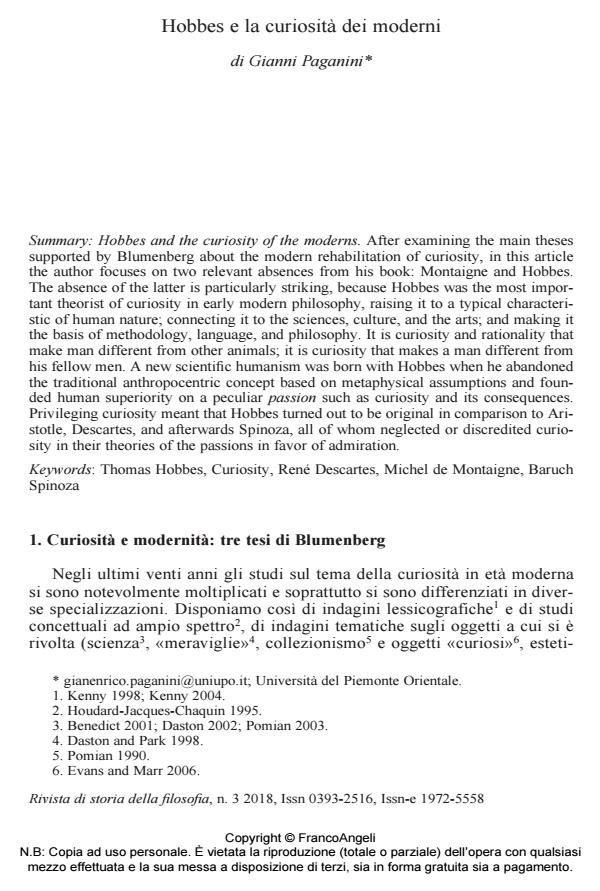Hobbes e la curiosità dei moderni
Titolo Rivista RIVISTA DI STORIA DELLA FILOSOFIA
Autori/Curatori Gianni Paganini
Anno di pubblicazione 2018 Fascicolo 2018/3
Lingua Italiano Numero pagine 21 P. 397-417 Dimensione file 75 KB
DOI 10.3280/SF2018-003002
Il DOI è il codice a barre della proprietà intellettuale: per saperne di più
clicca qui
Qui sotto puoi vedere in anteprima la prima pagina di questo articolo.
Se questo articolo ti interessa, lo puoi acquistare (e scaricare in formato pdf) seguendo le facili indicazioni per acquistare il download credit. Acquista Download Credits per scaricare questo Articolo in formato PDF

FrancoAngeli è membro della Publishers International Linking Association, Inc (PILA), associazione indipendente e non profit per facilitare (attraverso i servizi tecnologici implementati da CrossRef.org) l’accesso degli studiosi ai contenuti digitali nelle pubblicazioni professionali e scientifiche.
After examining the main theses supported by Blumenberg about the modern rehabilitation of curiosity, in this article the author focuses on two relevant absences from his book: Montaigne and Hobbes. The absence of the latter is particularly striking, because Hobbes was the most important theorist of curiosity in early modern philosophy, raising it to a typical characteristic of human nature; connecting it to the sciences, culture, and the arts; and making it the basis of methodology, language, and philosophy. It is curiosity and rationality that make man different from other animals; it is curiosity that makes a man different from his fellow men. A new scientific humanism was born with Hobbes when he abandoned the traditional anthropocentric concept based on metaphysical assumptions and founded human superiority on a peculiar passion such as curiosity and its consequences. Privileging curiosity meant that Hobbes turned out to be original in comparison to Aristotle, Descartes, and afterwards Spinoza, all of whom neglected or discredited curiosity in their theories of the passions in favor of admiration.
Parole chiave:Thomas Hobbes, Curiosity, René Descartes, Michel de Montaigne, Baruch Spinoza
Gianni Paganini, Hobbes e la curiosità dei moderni in "RIVISTA DI STORIA DELLA FILOSOFIA" 3/2018, pp 397-417, DOI: 10.3280/SF2018-003002